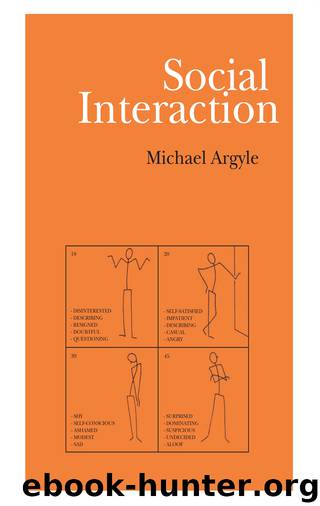Social Interaction by Argyle Michael

Author:Argyle, Michael
Language: eng
Format: epub
Publisher: Taylor & Francis (CAM)
T-groups and therapy groups
Finally we turn to a kind of group which did not exist until psychologists invented it. Just as physicists study particles created by special experimental techniques so it is of interest to study the forms social interaction can take under quite new conditions. In fact the processes of feedback and analysis of the group found in this setting also take place, although with less intensity, in other groups too. On the other hand these groups are very different from natural groups in a number of ways, so that the findings cannot simply be generalised to other kinds of group. There has been a certain shift of interest away from laboratory groups towards T-groups (cf. Mann et al., 1967), simply because the latter last longer and can be studied in greater detail. Apart from the limited generality of the findings it should be pointed out that most of these studies are essentially clinical investigations of a rather small number of groups (cf. Stock, 1964).
In most T-groups, about 12 trainees meet with a trainer for a number of 2-hour sessions; they may meet once a week, or more frequently for up to two weeks. The Harvard version has 20-30 members. The leader introduces himself, explains that he is there to help the members study the group, and then takes a passive role and leaves the group to get on with this task as best it can. From time to time he will intervene in various ways - (1) he shows how to make constructive and non-evaluative comments on the behaviour of members, (2) he shows how to receive such comments non-defensively, and learn from them, (3) he makes interpretations, i.e. explains what he thinks is happening, interpersonally, in the group, (4) he discusses the relevance and application of the group experiences to behaviour in real-life situations, (5) he tries to teach the members a more cooperative and less authoritarian attitude to people in authority. In addition to the T-group sessions proper there are sometimes lectures, role-playing and other ancillary training experiences (cf. Bradford, Gibb and Renne, 1964).
Therapy groups consist of a psychiatrist and usually 6-9 mental patients. The main differences from T-groups are that: (1) the members are emotionally disturbed and at a lower level of social competence, often suffering from real interpersonal difficulties; (2) the content of conversation is the actual symptoms or difficulties of group members; (3) the therapist creates an atmosphere of acceptance for sexual and aggressive material, but makes sure that the tension level does not get too high; (4) there is a greater gap between leader and group members the former is not simply a more experienced member of the group; (5) the behaviour of members in the group situation is used to diagnose basic personality disturbances, rather than indicating their level of social competence (Powdermaker and Frank, 1953; Foulkes and Anthony, 1957).
The members of T-groups are usually managers, social workers, clergymen or others whose work involves dealing with people. In practice they are often middle-aged men.
Download
This site does not store any files on its server. We only index and link to content provided by other sites. Please contact the content providers to delete copyright contents if any and email us, we'll remove relevant links or contents immediately.
Rewire Your Anxious Brain by Catherine M. Pittman(18617)
Talking to Strangers by Malcolm Gladwell(13331)
The Art of Thinking Clearly by Rolf Dobelli(10380)
Mindhunter: Inside the FBI's Elite Serial Crime Unit by John E. Douglas & Mark Olshaker(9294)
Becoming Supernatural by Dr. Joe Dispenza(8185)
Change Your Questions, Change Your Life by Marilee Adams(7717)
Nudge - Improving Decisions about Health, Wealth, and Happiness by Thaler Sunstein(7678)
The Road Less Traveled by M. Scott Peck(7574)
The Lost Art of Listening by Michael P. Nichols(7476)
Mastermind: How to Think Like Sherlock Holmes by Maria Konnikova(7304)
Enlightenment Now: The Case for Reason, Science, Humanism, and Progress by Steven Pinker(7287)
Win Bigly by Scott Adams(7170)
The Way of Zen by Alan W. Watts(6575)
Daring Greatly by Brene Brown(6486)
Big Magic: Creative Living Beyond Fear by Elizabeth Gilbert(5725)
Grit by Angela Duckworth(5576)
Ego Is the Enemy by Ryan Holiday(5391)
Men In Love by Nancy Friday(5218)
The Laws of Human Nature by Robert Greene(5134)
